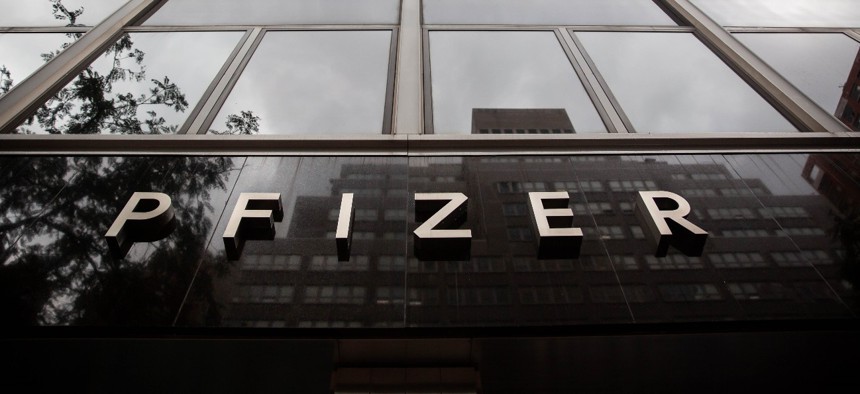
Pfizer is offering one of the approved oral antiviral medications for “mild-to-moderate” cases. Michael Nagle/Xinhua via Getty Images
FDA Greenlights Two Pills to Treat COVID-19
White House pledges equity in distribution of them.
In the span of less than two days, federal regulators have approved two pills to treat certain coronavirus cases.
While public health officials continue to urge vaccinations and booster shots as the first line of protection against the coronavirus, oral medication has become a possible option for some who have particularly bad cases.
On Wednesday, the Food and Drug Administration granted emergency use authorization for Pfizer’s oral antiviral medication for “mild-to-moderate” cases in individuals 12 and up who “are at high-risk for progression to severe COVID-19, including hospitalization or death,” said the agency.
Jeff Zients, White House coronavirus response coordinator, said during the COVID-19 briefing on Wednesday that the federal government has purchased 10 million courses of the pill, which is more than anyone else worldwide has purchased.
“We will have 265,000 treatment courses of Pfizer available in January, with monthly totals of pills ramping up across the year and all 10 million treatment courses delivered by late summer,” he said. “As quickly as Pfizer gets the pills manufactured and delivered, we will immediately provide them to states and jurisdictions for distribution.”
The FDA did not seek input from its advisory committee on this treatment.
“Policy analysts say that while the [FDA] isn’t required to convene an advisory committee meeting before it makes decisions on new products, these public discussions have helped educate Americans on the regulatory process throughout the pandemic,” Bloomberg Law reported on Wednesday. “Skipping this step for the Pfizer pill could affect the public’s level of confidence in the potentially lifesaving COVID-19 treatment and in the agency at large.”
Then on Thursday, the FDA gave the same approval for Merck and Ridgeback Biotherapeutics’ pill for “treatment of mild-to-moderate” COVID-19 cases in adults who are at risk of hospitalization or death and for whom alternative treatment options are not accessible or appropriate. In November, the FDA advisory committee voted 13-10 to endorse the pill as some committee members raised concerns about its efficacy and safety.
This pill has shown to reduce hospitalizations and death for high-risk patients by about 30%, compared to about 88% for Pfizer’s.
Zients said the government anticipates having about 3 million courses of this pill ready to send out by the end of January.
“Just as we’ve done with vaccines and monoclonal antibody treatments, we will ensure equity is at the center of antiviral distribution,” he said. “We are not only urging states to ensure equity in their own distribution plans, but we are also distributing antivirals directly to community health centers across the country.”
The Centers for Disease Control and Prevention does not need to provide further consideration after the FDA approves the treatments.
The approvals come as the highly transmissible Omicron variant is surging throughout the country and causing many people to cancel or change their holiday plans.
New studies from Scotland and South Africa show Omicron is less severe than previous variants.
“This is good news; however, we must wait to see what happens in our own population, which has its own demographic considerations,” said Dr. Anthony Fauci, director of the National Institute of Allergy and Infectious Diseases and chief medical advisor to the president, during the briefing on Wednesday. Also, “even if you have a diminution in severity, if you have a much larger number of individual cases, the fact that you have so many more cases might actually obviate the effect of it being less severe.”







